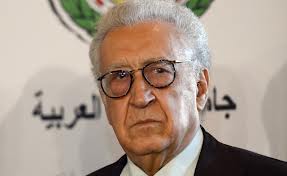UN-Arab League envoy Lakhdar Brahimi held fresh talks Friday to pave the way to the January peace conference between Syria’s government and rebels, amid wrangling over who will be at the table.
Brahimi and senior US and Russian officials met behind closed doors at the United Nations in Geneva, then held broader talks with fellow UN Security Council permanent members Britain, China and France, before sitting down with envoys from Syria’s neighbours Iraq, Jordan, Lebanon and Turkey.
The veteran mediator’s intensive shuttle diplomacy between Geneva, the Middle East and the capitals of world powers last month helped finally set January 22 as the start date for talks in Switzerland.
Delegates were tight-lipped as they arrived for Friday’s meeting, with Brahimi scheduled to brief reporters later in the day.
On Thursday, he had underscored that the Syrians themselves would have to drive the talks.
“There’s a necessity for national ownership of this process,” he said at the UN in Geneva.
All eyes are on the potential list of participants from Syria, amid opposition rifts between supporters of negotiations and hardliners who say even talking to the regime of President Bashar al-Assad is a betrayal.
Brahimi revealed that 26 states will take part in the Geneva 2 conference, including Algeria, Egypt, Lebanon, Oman, Qatar, Saudi Arabia and Turkey and hinted that no agreement has been reached yet n a role for Iran in Geneva 2.
The head of the Western-backed rebel Free Syrian Army, once the country’s strongest armed opposition force but now increasingly marginalised by Islamists, called Friday for unity in the rebel ranks.
“We consider that all those who fight against the criminal regime of Bashar (al-Assad) are our brothers, and we call on all revolutionary leaders to unify in the face of oppression,” General Selim Idriss said in a video published Friday.
Having begun as a rag-tag collection of military defectors and civilians taking up arms to defend peaceful anti-Assad protesters from a March 2011 crackdown, the rebels have been increasingly torn by ideological differences and conflicting interests.
Syria’s Kurds, meanwhile, said they looked set to send two delegations to the talks, one in the opposition camp and another with Assad’s representatives, to defend their minority’s interests.
There is also debate over which Middle Eastern countries should take part — beyond Syria’s neighbours who have taken in the overwhelming majority of the 2.4 million refugees from a war that to date has claimed over 126,000 lives.
There has been persistent wrangling over a role in the talks for Assad’s staunch ally Iran, also a leading backer of the Lebanese Shiite militia Hezbollah fighting alongside Syrian government forces.
Russia, a key backer of Assad’s regime, has sought to have Iran at the table, while Western nations are pushing for Saudi Arabia to take part.
Moscow’s strong support of the regime in Damascus was again highlighted Thursday when it blocked a US-sponsored UN Security Council statement denouncing Assad’s government for its brutal military offensive on the northern city of Aleppo, where scores of civilians have been killed in recent missile and “barrel bomb” attacks.
France said the indiscriminate air strikes on Aleppo amounted to war crimes.
And French President Francois Hollande warned that the conference could not be a success if it confirmed Assad in power.
The meeting cannot be “an objective in itself”, he said on the sidelines of an EU summit in Brussels.
Saudi Arabia and fellow Sunni monarchies in the Gulf, such as Qatar, are major backers of the rebels in Syria’s civil war, which has morphed into a sectarian battle between Islam’s two main branches.
Whichever foreign countries take part, Brahimi has underscored that they will only be invited to the January talks’ opening day, before the Syrians meet.
The so-called Geneva II conference is meant as a follow-up to one held in June 2012, where world powers issued a call for a Syrian transition government.
But Syria’s warring sides failed to agree on whether Assad or his inner circle could play a role in the process, and amid spiralling fighting plans for Geneva II repeatedly were put on hold.
The January 22 session will in fact be held in Montreux, a city 90 kilometres (about 60 miles) northeast of Geneva.
The negotiations involving the two Syrian delegations and Brahimi will continue at the UN in Geneva on January 24 but it remains undecided how long they will last, his staff said.
AFP/Agencies


Leave a Reply
You must be logged in to post a comment.